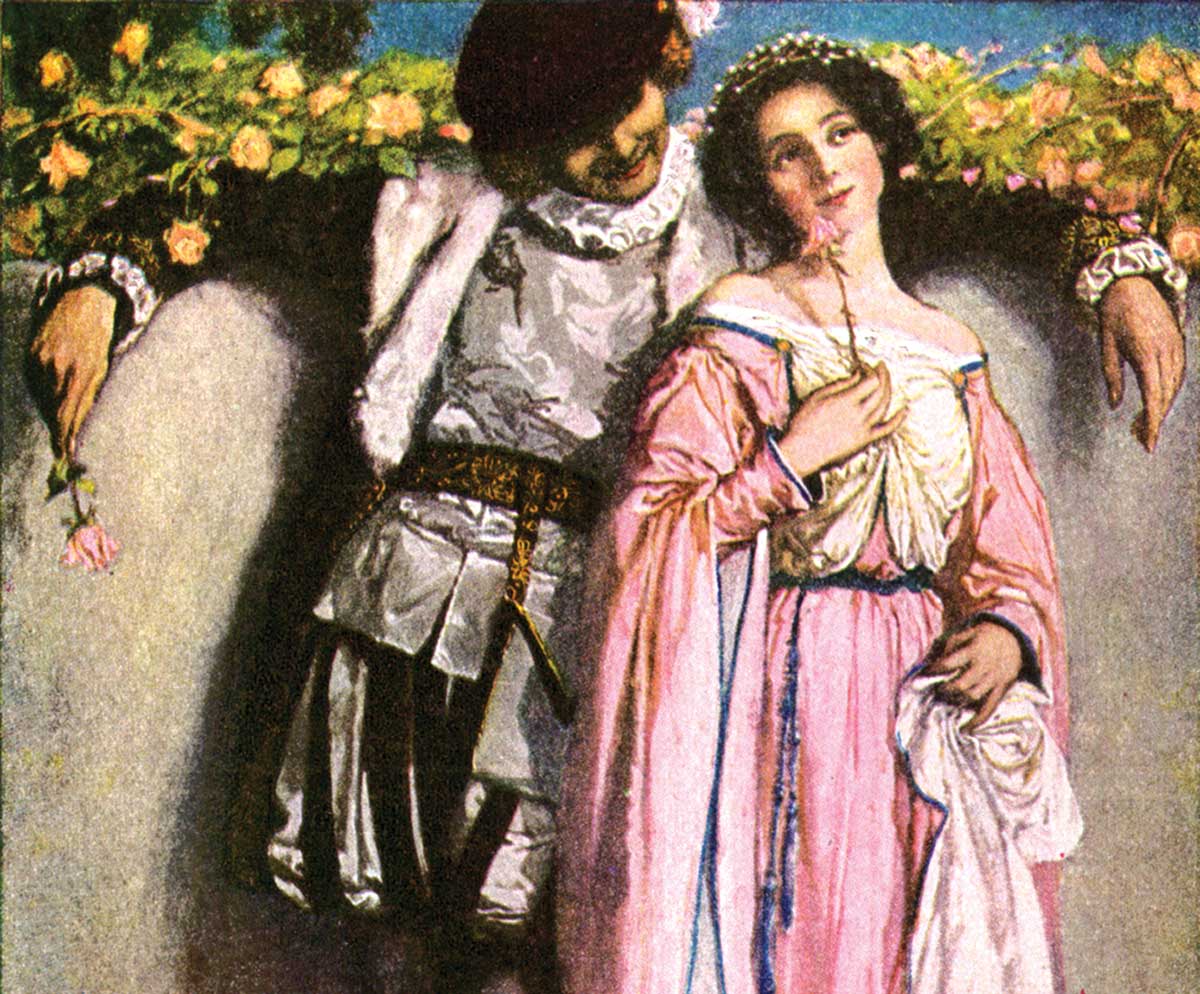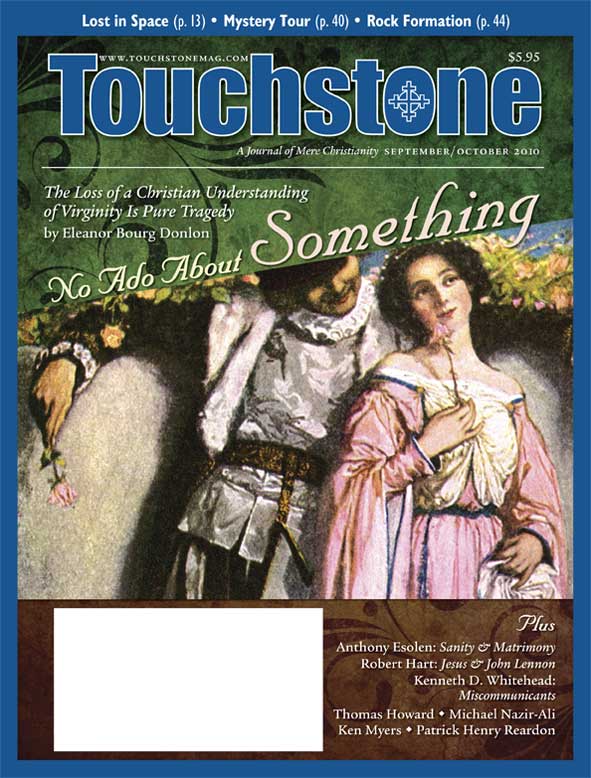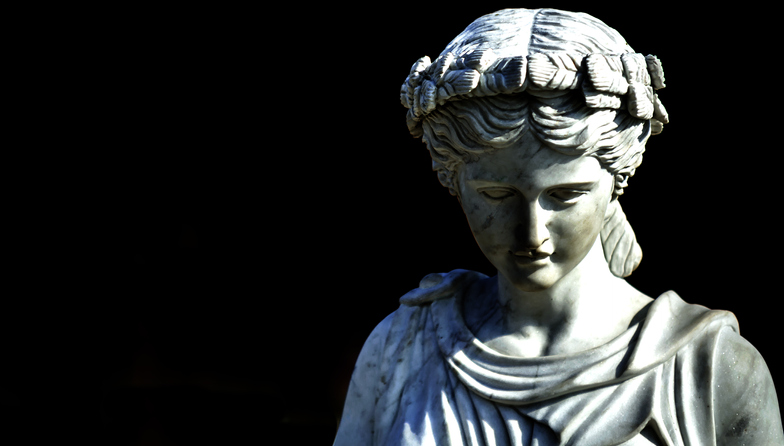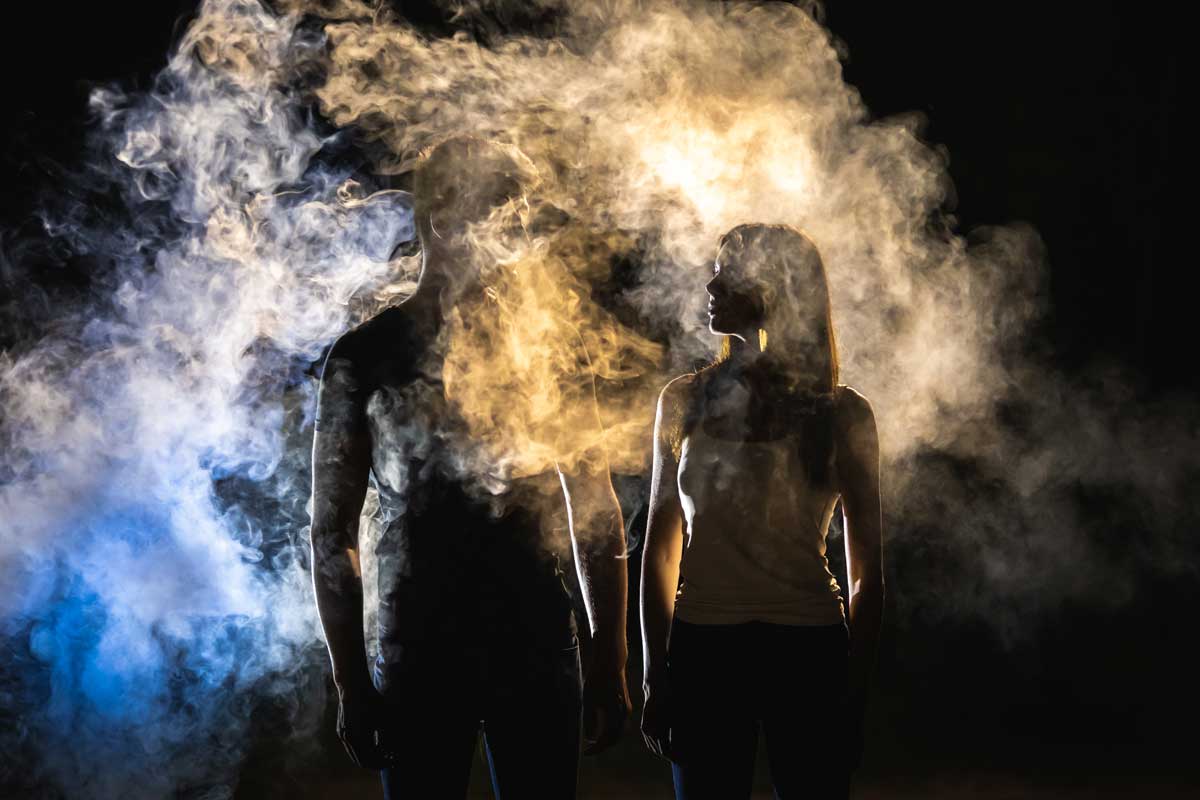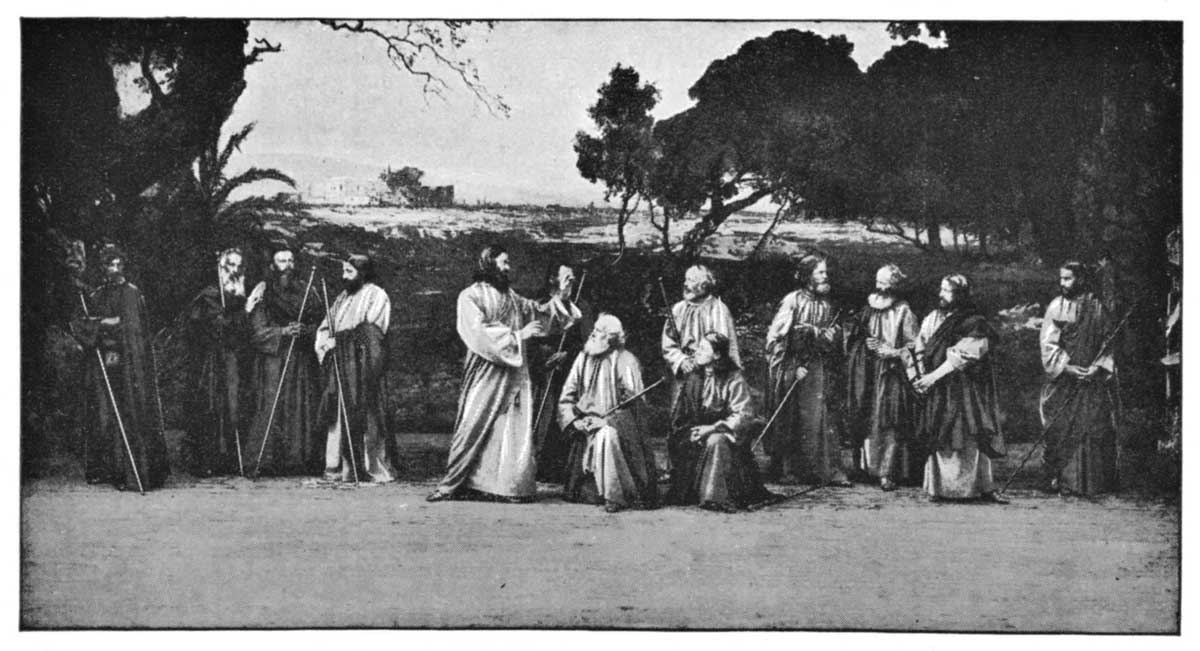Feature
No Ado About Something
The Loss of a Christian Understanding of Virginity Is Pure Tragedy
by Eleanor Bourg Donlon
The drama of Shakespeare’s Much Ado About Nothing hinges on the question of a young lady’s virginity. Is Hero the innocent maiden she appears to be, or is she a brazen, despoiled liar? After various plot twists and turns, the play concludes with the assertion of her virtue: “Nothing certainer,” she declares. As “surely as I live, I am a maid.”
Such a plot point would be unlikely to resonate with many modern viewers. “Why should she be a virgin, anyway?” one might ask. “Is there something wrong with her?”
The BBC certainly found it problematic. In its 2005 version of Much Ado, one of four plays adapted for its 2005 television series ShakespeaRe-told, the “problem” of Hero’s virginity was firmly dealt with—by having it summarily defused as an issue from the get-go. No shrinking virgin violet this Hero. Modern audiences could tune in without fear.
But this is more than a question of literary license; the point at stake is a modern moral disconnection, which is aptly illustrated by the juxtaposition of Shakespeare’s original play with the 2005 adaptation. And the consequences of this moral disconnection are of staggering importance, far beyond any questions of the BBC’s ratings.

Two Very Different Heros
In Shakespeare’s play, the villainous Don John, driven by hatred for his regal brother, Don Pedro, and for his brother’s lieutenant and close friend Claudio, concocts a plot to sabotage Claudio’s pending nuptials to the beautiful and virtuous Hero. The villain insists that Hero is “no maid” and stages a scene in which he tricks Claudio into believing he overhears Hero cavorting with a lover (it is really Hero’s maid with one of Don John’s servants).
Stricken and outraged, Claudio waits till all are assembled for the marriage ceremony, and then he and Don Pedro denounce Hero as “an approvèd wanton . . . a common stale.” Hero faints from shock and is believed to be dead. But all ends well, for Don John’s plot is uncovered, and Hero’s “death,” which proves to have lasted “but whiles her slander lived,” is followed by her social rebirth with her virtue triumphantly reestablished. The play concludes with embracing and dancing, and with more than one wedding in the offing.
Contrast this to the BBC’s 2005 Much Ado. This tale takes place in a television news studio. Weathergirl Hero is willing to sleep with the morose and universally disliked Don because she feels sorry for him. Their liaison takes place off-screen, but their heart-to-heart discussions of feelings and relationships are sufficiently nauseating to the viewer.
The faint and pretense at death of the play’s Hero are morphed in the BBC version into a life-threatening accident. The modern Hero “dies” to escape male persecution. Her erstwhile bridegroom, Claude, is overwhelmed with sorrow—not because she is innocent, but because, since he was so anti-modern as to care about her virtue in the first place, he had cruelly and tactlessly exposed her before their mutual friends.
In the BBC retelling, there is no possibility of redemption for the morose young Claude, and no chance of a reunion with his discarded fiancée. Instead, the story ends with a convalesced Hero swearing off marriage forever.
The Virgin Blight
The “nothing” of Shakespeare’s play primarily refers to the fact that the scandal is false, insubstantial, a tissue of lies concocted by a villain. The other characters’ fear that Hero is “but the sign and semblance of her honour” proves unfounded; her honor is both authentic and sure.
But the modern Hero really is but the sign and semblance of honor—“most foul, most fair! . . . pure impiety and impious purity!”—and so the plot of the BBC version is no longer about virtue and slander; it is about exposure and “unfair” (though factually accurate) moral judgment. Consequently, the story no longer makes sense. It is a whole lot of bother about nothing, a cynical view of “love” gone awry.
This is not just the stuff of BBC screenwriters; the anti-virginal creed is loudly proclaimed by all the major bastions of secularism: Hollywood, the media, and the university. Thus, last year we had the sensationalized tagline plastered across the cover of the July 2009 issue of Cosmopolitan magazine: “Virgins in Cosmo! (We Thought This Day Would Never Come).” As Colleen Raezler, research assistant at the Culture and Media Institute, dryly commented: “It seems like abstaining from sex is now the only thing that shocks in our sexualized culture.”
Not that the article in Cosmopolitan championed abstinence. Both the interviewers and interviewees were quick to produce their credentials from the School of Free Love. The stories told in the article were not those of faith-filled young women embracing chastity, but examples of the modern “game” of dating, where virginity is devalued into little more than a stage in a strip tease—or rather, a non-strip tease.
The article reminded me of certain incidents from my undergraduate days—such as when a self-proclaimed lesbian in one class expressed horrified disgust at the thought of nineteenth-century cultural giant John Ruskin’s pre-marital (and probably post-marital) virginity. “Can you imagine?” she demanded. The choral agreement of the other young women in the room indicated that they shared her indignation. Virginity, it seems, is a disease and blight to the liberated modern woman, something to be eliminated—rather like pregnancy.
Defining Virginity
A rather different debate took place in another class, over Wuthering Heights. The professor put forward the thesis that, since Heathcliff never consummated his relationship with Cathy, he should be considered a virgin. When I protested, and produced as evidence Heathcliff’s son, as well as his thoroughly documented sowing of the proverbial wild oats across Europe, I was told that these “didn’t count” because he didn’t love those women. So now virginity was a matter of emotional attachment.
The notion that the definition of virginity is up for debate was also reflected in a 2006 Washington Post article whose author claimed that, as religious creeds and scientific understanding developed over the centuries, various definitions were put forth. The author then launched into a rather distasteful analysis of the nuances of “the virgin,” as if virginity were some sort of sociological phenomenon to be studied in a laboratory.
This nominalist-inspired search for a particularized definition serves only as a platform for the argument that virginity (and morality generally) is a malleable and socially constructed concept. This view provides a vantage point for working out an itemized rulebook for degrees of permissibility in sexual matters, but not for endeavoring to understand moral law holistically and in its proper context: man’s journey toward or away from God.
My old professor and the Washington Post writer notwithstanding, we may define a virgin as a person who has not experienced sexual intercourse. In the Classical world, the word was rarely applied to men except in a metaphorical sense. The term principally meant a marriageable young woman, a virgo intacta, that is, a woman whose bodily integrity had not been compromised.
The pre-Christian application of the term predominantly to women is significant, for it is only the woman who, upon the loss of her virginity, is irrevocably changed, her flesh materially altered. A female virgin is something physically different from a female non-virgin.
Further, sexual profligacy on the part of a woman could completely disqualify her from participation in society—that is, from marriage. This point may seem obvious, but it is critical to a proper understanding of the importance of virginity in both its cultural and theological contexts—and in Shakespeare’s play.
A Matter of Consequence
The different roles and impulses of the two sexes, which are represented in their basic biological makeup, are also very important in Much Ado. Man’s sexual impulse is outward, and needs to a degree to be physically aggressive—this makes him particularly suited to cherish and protect. Woman’s sexuality is housed, protected, kept like a jewel within her body—this makes her particularly suited both to bear children and to stand as a representation of moral and cultural stability. This dynamic of protector and moral center is essential to Shakespeare’s plot.
If Hero is not what she appears to be—if her name is blotted “with any just reproach”—the entire framework of society is compromised. She is the physical manifestation of both her father’s honor and the lasting consequence of his house. Consequently, there is a feeling of wholesale cultural degradation when her honor is questioned. Her father, Leonato, considers committing suicide himself, even as he avers what a mercy it would be if Hero were to die. Her disgrace is his disgrace, just as her flesh is his flesh. Claudio also feels tainted by association, and even Don Pedro feels “dishonored.”
The depiction of the role of male protector in the play is more complex. Beatrice, Hero’s cousin, has never doubted her innocence, and cries out passionately against her slanderer: “O God, that I were a man! I would eat his heart in the marketplace.” But at first, there are few male champions at Hero’s side except the friar, who, convinced of her innocence, works to prove that fact to her family, not to mention the world at large. Eventually, in the aftermath of Hero’s “death,” Claudio faces not one but three challenges—from Leonato, from Leonato’s brother Antonio, and from his friend Benedick—in defense of Hero’s honor.
The business of Hero’s virginity, then, is clearly taken seriously on all sides. Take away her virginity and you take away the entire premise of the play. It is no longer even a comedy; it becomes a tragedy. Crudely put, the god Hymen is incongruous as the deux ex machina of Act V if his anatomical namesake has already been routed offstage before the play opens. Many innovations are possible when adapting Shakespeare to the modern era, but that change is inconceivable. To understand this even more fully, it is necessary to reconsider the anatomical fact of virginity in the light of eternity.
Two Distinct Virtues
Chastity and virginity are not the same thing, though they are intimately related. Chastity is a virtue that properly orders the sexual appetite to be in harmony with reason. Moreover, within the context of Christian morality, there is a crucial difference between the natural virtue of chastity and the infused virtue of chastity, which orders the sexual to be in harmony with reason elevated by faith. This higher capacity is an integral part of the moral life of the Christian and its stance toward its supreme end (eternal beatitude). This theological precision is necessary to a proper understanding of the function of sexual morality in the Christian life and (since the play operates within that context) in Much Ado.
Virginity is something quite distinct and specific. Aquinas addresses the point with characteristic clarity:
The formal and completely constituting element in virginity is the purpose of perpetual abstinence from sexual pleasure; which purpose is rendered praiseworthy by the end in view, inasmuch as it is taken up to find free scope for divine things. But the material element in virginity is the integrity of the flesh, void of all experience of sexual pleasure.
The material element is the point that is currently being labored to death. So closely do the proponents of sexual license look at the material that they fail to see what is in front of them. They are too busy promoting their morality of degrees to care about the integrity of the flesh, too eager to justify lifestyles to bother about true quality of life, and too blinded by sin to recognize the deep and abiding trauma that afflicts so many young people today.
But Aquinas’s definition describes something more than the negative things that are inherent in the “loss”—both material and cultural—of virginity, of this “integrity” of the flesh. There is a positive component as well, an extraordinary and rich reality toward which he gestures with the phrase: “free scope for divine things.” Aquinas continues:
But where there is a special matter of goodness, having a special excellence, there is found there a special character of virtue: as appears in munificence, which has to do with large expenditure, and is thereby a special virtue distinct from liberality, which deals in general with all use of money. But the keeping oneself void of experience of sexual pleasure has a degree of excellence and praise above keeping oneself free of the inordinate enjoyment of sexual pleasure. And therefore virginity is a special virtue, standing to chastity as munificence to liberality.
Housed in Flesh
It would be a grievous mistake to dismiss Aquinas’s words as simply applying to those called to a life of consecrated virginity. The relation of virginity to chastity serves as the worthy and proper basis for the married vocation as well. This is because the call to be united with the Trinitarian Reality for all eternity is so bound up with man’s essence that it is housed in his very flesh. Man desires nothing more than to give himself fully to the other. The “special character of virtue,” housed in the integrity of the flesh, makes more fully and seamlessly possible the nuptial gift of self.
This physical integrity, moreover, reflecting as it does the full integrity of man in his original state, at the same time images the exquisite, unspoiled beauty of the receptive soul—receptive to the Incarnate God firstly (this is our eschatological goal) and to one’s fellow man secondarily (this is the human communion to which we are called in our earthly life). Such is the soul courted by the Divine Bridegroom, himself born of a virgin.
It is not accidental that in ancient Greece parthenos (virginity) was a god-like quality (most clearly demonstrated in the goddess Athena). Such an unfractured personhood is necessary to the true “hero.” Indeed, as a “virtue,” virginity contributes to the strength of character that makes men truly strong (virtue) or, as the Latin implies, “manly” ( vir). It is good to recall that this is the soul of Man ( adam) here described, not man ( ish) or woman ( isha). We can therefore steal a march on feminist scholars and speak of “Hero” as representing both sexes.
Holding Out for a Hero?
“Where have all the good men gone and where are all the gods?” laments Bonnie Tyler in her 1984 hit single “Holding Out for a Hero.” Tyler goes on to catalog the characteristics of the imagined hero and to detail her intense emotions and frustrated desires. Seen in a spiritual light, her apocalyptic, pseudo-Romantic frenzy in imagining his approach is deeply interesting; seen in the context of the present aftermath of the sexual revolution, her quest casts into sharp relief a question that is rarely asked: Where have all the “good” men gone?
The defense of male virginity is an important and often neglected component of this issue. The valuing of male virginity is principally, if not entirely, a Christian novelty. But even in Christianized history, sexual profligacy has almost always been considered more culturally acceptable in men than in women. Men are expected to sow their wild oats liberally, preferably before marriage. The reason for this is partly to be seen, once again, in the anatomical realm—the male sexual instinct moves outward, and the effects of sin are not marked in his flesh. It is interesting to note that Leonato initially thinks that Claudio’s accusation of Hero means that he has himself “made defeat of her virginity,” but the topic under discussion remains Hero’s sin, not Claudio’s.
Men are domesticated when women allow nothing less. Tragically, too many women have bought into the lie that “free love” will get for them something they perceive men as having possessed across the centuries—some sort of empowering license. Even greater than their desire for this specious “equality” is their desire for love—something that modernity insists is tantamount to sex.
Consequently, man is left a sort of unsophisticated brute animal, imprisoned by his carnal appetites. Even so, there remains in the hearts of many men a vague desire to find a “nice virgin” to marry. This should not be mistaken, as it often is by academics, for a perverse desire to desecrate the sacred (though the challenge, particularly with the promise of full and complete possession, is a component of the attraction—as C. K. Dexter Haven, in The Philadelphia Story, puts it in a slightly different context: “This citadel must and shall be taken and I’m the boy to do it!”).
Valuing What Was Lost
One of the most grievous effects of the loss of virginity for both men and women is the fracturing of the human person. In a contradictory search for fulfillment, pieces of the broken self are parceled out and lost. The fragmented person is undervalued, both by the self and by society at large. How many people are there who honestly and deeply desire a puzzle with pieces missing? Who but those who cannot find a complete one would figure that half a puzzle is better than none? The modern world is crowded with men and women wandering around unfulfilled, engaging in the “game” in which everyone loses, wallowing in cheap sex and never recovering from the trauma of that first appalling loss.
The Christian innovation looks beyond the more obvious example of the integrity of the flesh represented in the female to see the issue in its properly human (that is, applying to both male and female) context. Only in this context can the value of female virginity truly shine forth in its proper place in the divine economy, as a shared prefigurement of the divine union. The valuing of both sexes shows the full potentiality of man at its highest; the devaluing of men disjoints the moral understanding; and the devaluing of men and women drags humanity to its lowest ebb.
This is not to say that loss of virginity should entail a complete and utter loss of hope. Quite the contrary. Our Lord came to call sinners, to redeem the fallen, to reclaim the lost. Puzzle pieces are not irretrievable; the transformative power of grace renews life, rejuvenates the weakened, and reunites the fragments. But for the fallen to experience a full reclamation, they must first learn to value what was lost. This is demonstrated in the friar’s belief that, hearing of Hero’s “death,” Claudio will mourn and regret his accusation of her—“No, though he thought his accusation true.”
The Fate of Hero
As Pope John Paul II wrote in his Apostolic Exhortation of November 22, 1981, Familiaris Consortio: “Love is the fundamental and innate vocation of every human being.” When Benedick pledges that he will behave “As secretly and justly as your soul/ Should with your body,” he drives home the crucial point: The proper integration of body and soul, the authentic integrity of the self, the only human state in which personal, living communion is possible—the love to which all men are called. It is through such love that personal dignity is regained, and the integrity of the person leads to the perfect integrality of the gift of self, leading to spiritual communion.
Such communion entails a full encounter of persons—a knowing of each other that prefigures the eternal encounter with God, who knows each person intimately and perfectly. The characters in Much Ado spend a great deal of time masked, and they visit all sorts of deceptions upon each other—some innocent, some harmful. In the end, however, all masks are removed, and Hero is shown clearly for who and what she is. Claudio at first does not know her; he cannot know her until she is revealed to him most perfectly in her virginity. This is the perfect answer to Claudio’s cry at their demolished wedding:
O Hero! what a Hero hadst thou been
If half thy outward graces had been placed
About thy thoughts and counsels of thy heart!
In the end, virgins are made or broken by a simple biological fact—that “material element” that Aquinas appropriately describes as “the integrity of the flesh”; but to see only the biological aspect of that fact, outside its compass in the divine economy, is once again to miss the point, and to ignore the devastating effects that the undervaluing of morality has had in so many lives. We need only recall what the modernized BBC Hero suffered as a consequence of her lustful adventures: cynicism, coldness of heart, and detachment from love. In this respect the film does indeed authentically portray how both love and sex fare in a culture that dismisses virginity as nothing.
The Door to Peace & Virtue
There can be no recovery from the loss of virginity until the deflowered are able—and allowed—to recognize the value of what has been lost. Only then can repentance open the door to the joyful peace of reclaimed virtue. Then the movie Hero, who once was dead, could live—if not as a maid, at least with the dignity properly belonging to a creature fashioned in the image and likeness of God.
Then virginity—that discarded “nothing” that means so much—will return to its proper place in the overarching structure of an authentic, divinely oriented, and divinely directed morality, the only pathway to true human happiness. Until then, the solemn hymn sung at the tomb of Hero must retain its sorrowful resonance:
Pardon, goddess of the night,
Those that slew thy virgin knight;
For the which, with songs of woe,
Round about her tomb they go.
Midnight, assist our moan;
Help us to sigh and groan,
Heavily, heavily . . . •
Eleanor Bourg Donlon , a Dappled Things (www.dappledthings.org) assistant editor, works as a freelance writer and editor in Charlottesville, Virginia. Her writing has also appeared in The Saint Austin Review. More of her work is available at eleanorbourgdonlon.com.
subscription options
Order
Print/Online Subscription

Get six issues (one year) of Touchstone PLUS full online access including pdf downloads for only $39.95. That's only $3.34 per month!
Order
Online Only
Subscription

Get a one-year full-access subscription to the Touchstone online archives for only $19.95. That's only $1.66 per month!
bulk subscriptions
Order Touchstone subscriptions in bulk and save $10 per sub! Each subscription includes 6 issues of Touchstone plus full online access to touchstonemag.com—including archives, videos, and pdf downloads of recent issues for only $29.95 each! Great for churches or study groups.
Transactions will be processed on a secure server.
more on sex from the online archives
more from the online archives
calling all readers
Please Donate
"There are magazines worth reading but few worth saving . . . Touchstone is just such a magazine."
—Alice von Hildebrand
"Here we do not concede one square millimeter of territory to falsehood, folly, contemporary sentimentality, or fashion. We speak the truth, and let God be our judge. . . . Touchstone is the one committedly Christian conservative journal."
—Anthony Esolen, Touchstone senior editor





